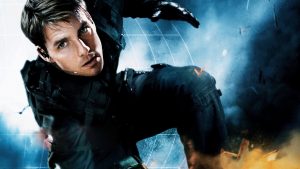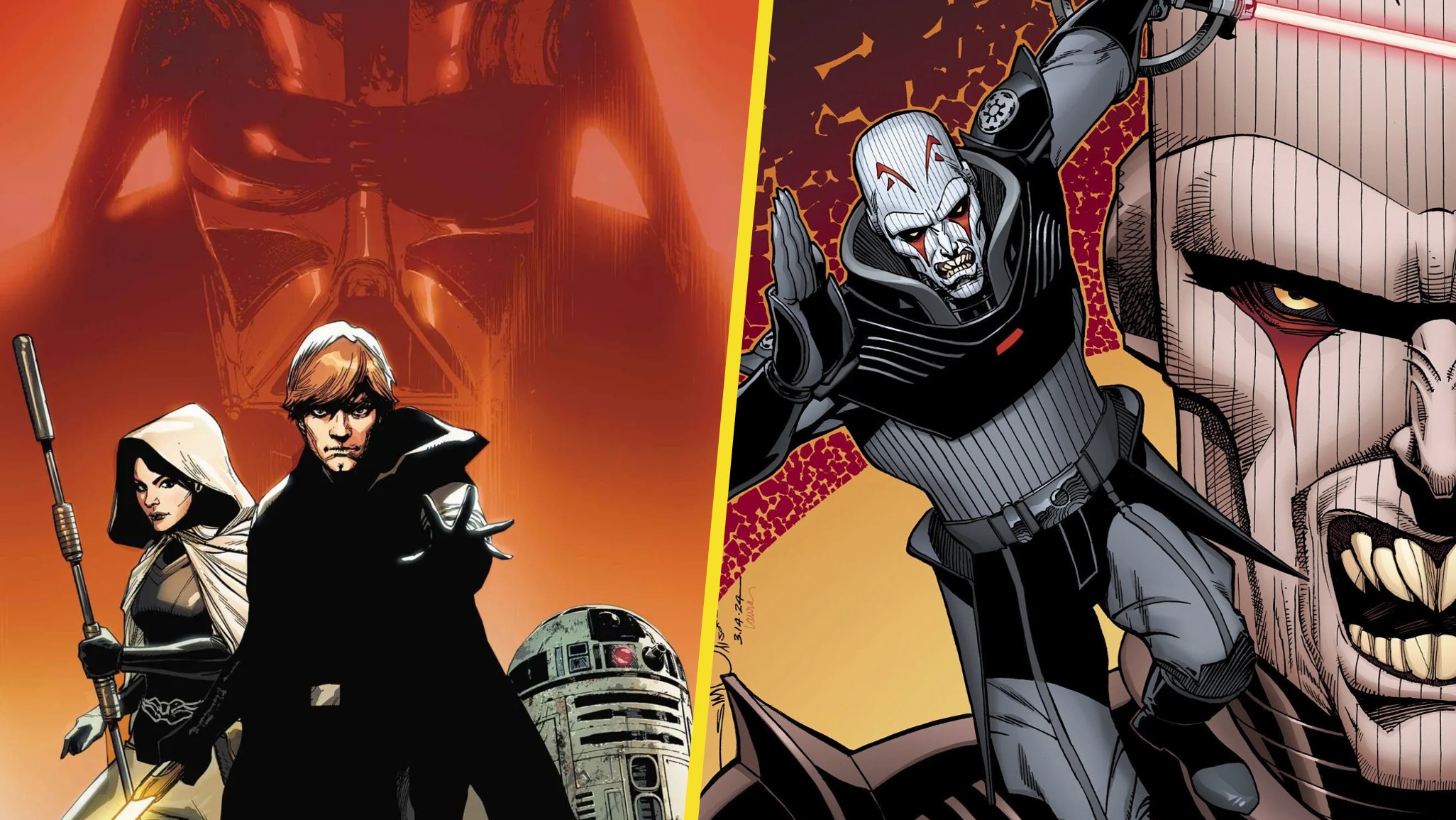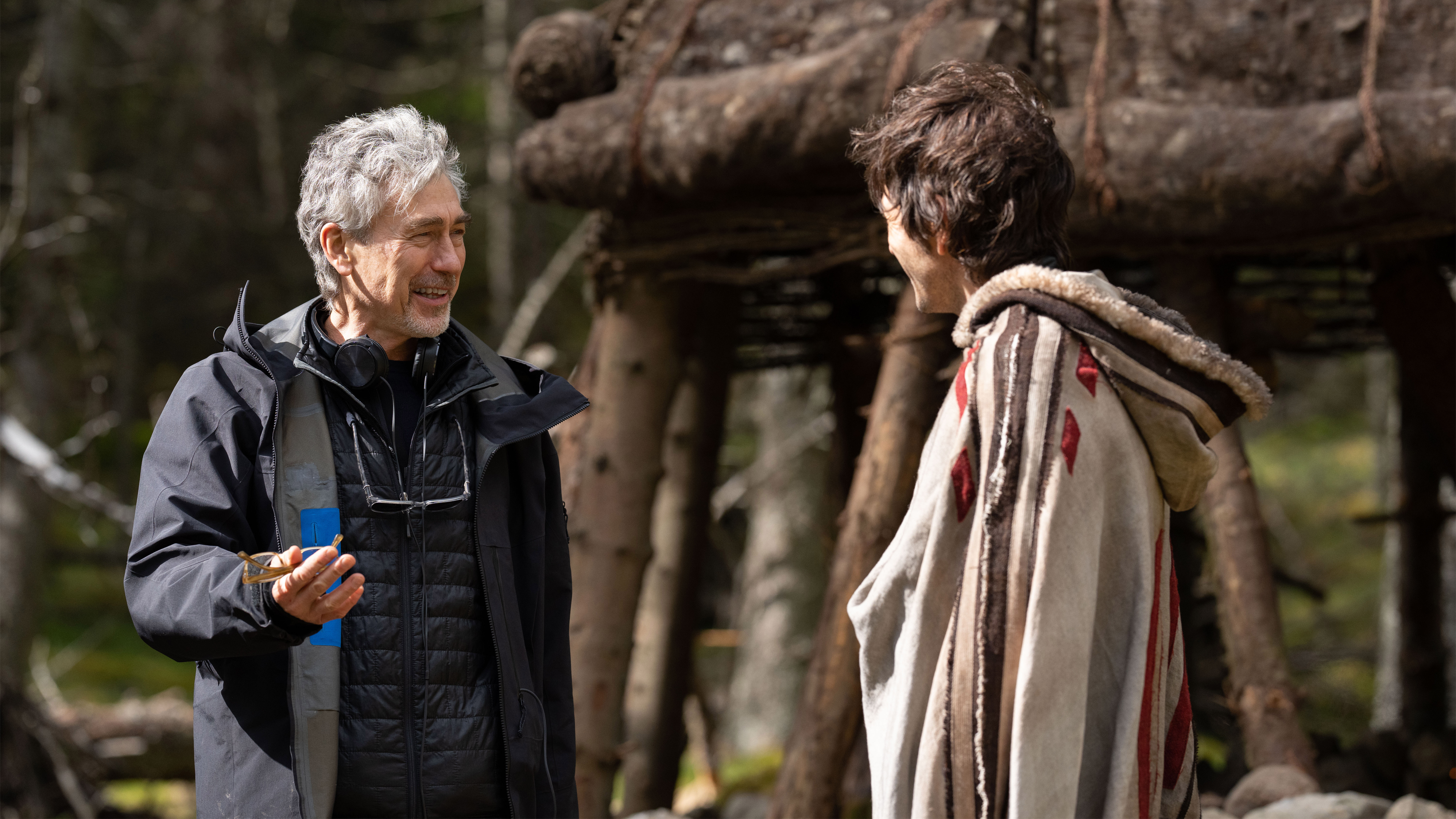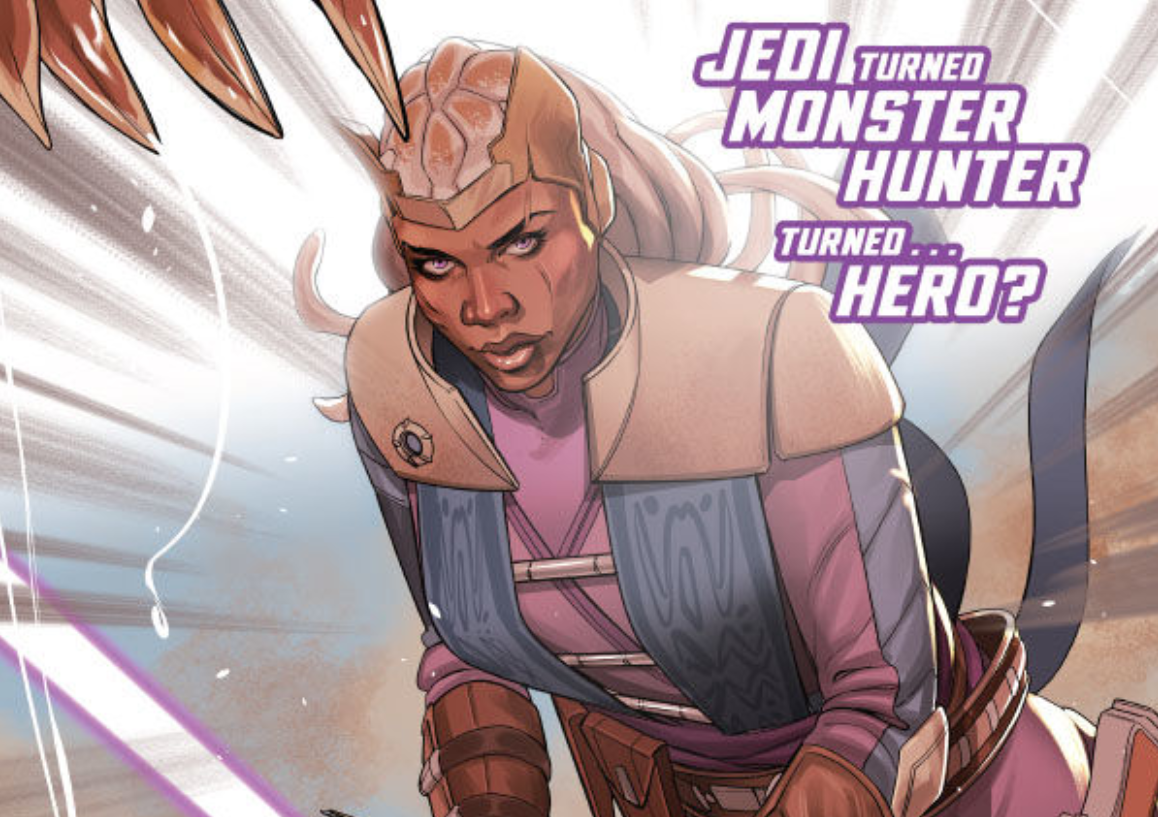Ethan Hunt: The Journey to Fallout
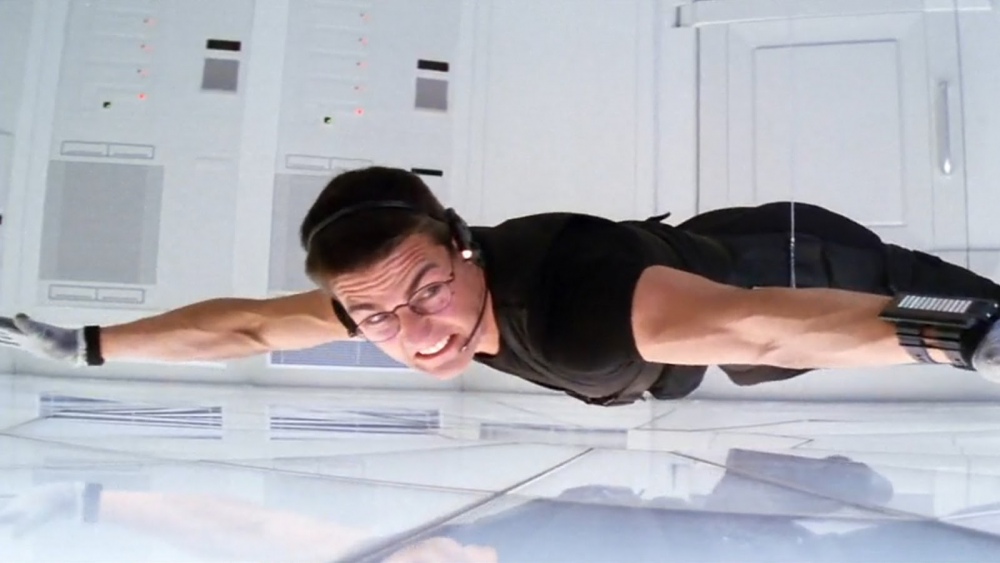
There’s something that always sat strange with me after viewing each entry in the Mission: Impossible franchise. Let me preface by saying I love these films, even the weaker links in the franchise (cough…cough…M:I2), and I’ve been enjoying them since the first one made it’s theatrical debut. The thing that always left me scratching my head was how I became so invested in Tom Cruise’s protagonist, super-spy Ethan Hunt, when the character is written in the broad strokes of an altruistic hero who is there to jump off buildings, blow things up, and save the world. Each time the familiar theme song queued up and the end credits rolled, I found myself wanting to know more about Mr. Hunt, as at that point I felt like I’d been through life and death with him. I wanted to know more about Ethan Hunt and his journey, and after five films, I still feel like I barely know the guy. So when the plot of the next installment, Mission: Impossible – Fallout, hinted this film would be taking a deep dive into everything Ethan Hunt, I thought it was high-time to take a deep dive of my own.
I’d be lying if I said I didn’t consciously compare Ethan Hunt to James Bond, and have since I saw the first Mission: Impossible film. Honestly, I think that says a lot about the fondness I have for the character Ethan Hunt if I’m comparing him to the greatest spy in cinema and one I’ve been watching since I was a child. James Bond stands apart, to be sure, but the same compelling characteristics are found in Ethan Hunt. Hunt is mysterious, confident, precise, and lethal. Hunt takes dangerous risks and makes split-second decisions where the loss of his life could be the consequence. Where James Bond is a womanizer, Ethan Hunt is the man someone takes home to their parents. Where the two are different, they are starkly different. I’m glad the character of Ethan Hunt stands on his own, as anyone trying to ride the Bond-imitation wave usually flies too close to the sun. So, I’m now asking myself: What do I know about Ethan Hunt?
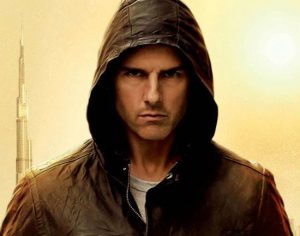
A good place to go looking for answers to questions about Hunt would be to the man who’s portrayed the spy in all six films: Tom Cruise. Cruise has been playing this character for over twenty-years – and granted there have been gaps between entries – and he shows no signs of slowing down in how he wants this character to grow. Each film, Ethan almost seems like a different character, but it’s really just the growth of a man who often finds himself in extraordinary situations and under extreme pressure. I feel like Mission: Impossible III was a significant turning point to the character shedding some of his action-hero facade and appearing more human. We’d seen hints of it in the romance between Hunt and Nyah Nordoff-Hall (played by the excellent Thandie Newton) in M:I-2, but Ethan really bared his soul in it’s sequel. Let’s not get ahead of ourselves though. Tom Cruise has brought so many dimensions to Hunt and I imagine we are going to see many more in his sixth performance, Fallout. I’d bet if the latest installment is successful and Hunt makes it out alive, a seventh is not out of the question. I’ve never read or hear an interview with Cruise even suggesting there was a timetable to end his role in this franchise.
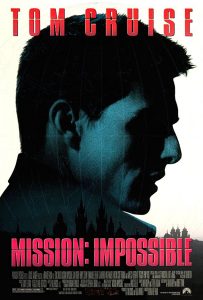
In 1996, the world was a very different place. Bill Clinton was president, 9/11 was five years away, and global threats of terror were yet to galvanize the western world. This was the year the first Mission: Impossible film took place, and to be honest, when I saw it as a 15-year-old just biding his time before the next James Bond film, I wasn’t crazy about it. The biggest problem I had with the film as a teenager was that Tom Cruise’s central character had the emotional depth of a wading pool – at least that’s what I remember perceiving as a teenager. On top of that, the film is directed by Brian De Palma, and it is very much a Brian De Palma film. What I mean by that is it’s very visual, the dialogue is often claustrophobic and tense, and the Kubrickian dehumanization of the film’s protagonist and antagonist reach fever pitch as the film builds towards it’s climax. This is a problem I’ve often had with De Palma films: His characters come across as robotic caricatures, betraying what the story often suggests they should be, and by the time the emotional volcano of his repressed vignettes erupts, it almost seems comical. Looking at you, Tony Montana.
Don’t get me wrong – Tom Cruise is great in the film, it’s just that the story is so complex and unfolds at a grating pace, that you feel kind of lost. Not to mention, it seems almost every character in the film removes a mask of someone they were pretending to be, in a gimmick that becomes the franchise’s signature. We do learn a bit about Ethan Hunt, though.
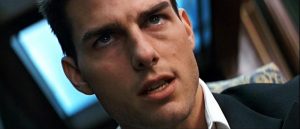
The plot of Mission: Impossible is one that reoccurs throughout the franchise: Ethan Hunt and his team of IMF (Impossible Mission Force) agents are caught up in an internal fray of their own agency and are set up to take the fall for a person higher-up in their agency selling secrets to the bad guys. The film opens with a pretty spectacular, whodunnit scene where Ethan watches members of his team murdered across the city of Prague. Ethan finds them all dead and then meets at the rendezvous point with a government spook who concludes the surviving spy must be behind the murders. Hunt realizes he’s been set up, blows up a giant fish tank in the swanky seafood restaurant that served as the rendezvous point, makes his escape, and then starts his journey across Europe to find out who set him up – as well who was behind the murder of his team.
We get the sense that Ethan is fairly new to the world of the spy. His mentor – Jim Phelps (Jon Voight) – is the team leader of the disastrous operation in Prague. There is a sense that Ethan wants justice, but seems particularly affected by Phelps’ death. This bond he has with Phelps is later the knife in his back, as he learns during the climax of the film that Phelps is the one who betrayed the team. It’s never made clear, but we get the sense that Ethan didn’t have a father. There is a brief plot-twist midway in the film where the government has Ethan’s mother and uncle arrested to try and “smoke out” their fugitive spy. By there being no mention of a father, I assume the patriarch of the Hunt family is either deceased or estranged. Either way, Hunt’s emotions really come out toward the end of the film when he realizes his trust in Jim Phelps has been manipulated and betrayed.
If we look at Mission: Impossible solely as a film to introduce the character of Ethan Hunt, we learn very little about his personality. He is cold, clinical, but as a cookie-cutter staple in most characters Cruise plays, can become emotionally vulnerable and volatile on the turn of a dime. By the end of the film, Ethan Hunt has been through some serious stuff. He’s lost his colleagues, been betrayed by his mentor – as well as his government – and is a pretty stone cold spy when he’s handed the betamax cassette with his next mission embedded on it before the credits role. Oh, and there is that scene where he breaks into the CIA headquarters to retrieve a disk in what has to be one of the top ten most tense scenes in modern cinematic history. You know, the one where he’s dangling by cables over a computer terminal and has to keep his body temperature from rising or the alarms will go off. Ethan Hunt seems to come into his own by the end of the film, but by the time we catch up with him four years later in Mission: Impossible II, the character is barely recognizable.
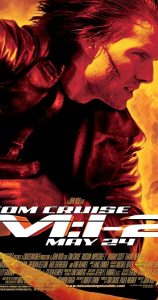
Let’s get this out of the way: Mission: Impossible II is not the strongest entry in the franchise. As with Brian De Palma leaving his signature all over the first film, his successor – Hong Kong director John Woo – didn’t hesitate to make possibly the biggest John Woo film ever. This film, love or hate it, certainly goes big, but that’s often to it’s detraction, especially if you were hoping to learn a bit more about the franchise’s protagonist. This film is a sizzle real of fast fights, motorcycle chases, car chases, insane jumps, and a villain so over the top it’s almost hard to take him seriously. It is unapologetic in everything it does and I give a lot of credit to Woo for confidently making the film his way, even if his technical prowess in the symphony of cinematography, pyrotechnics, and stunt-work leaves the viewer a little fatigued by the end of the film.
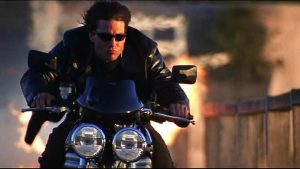
In Mission: Impossible II, Ethan Hunt has traded his slow-burn, subterfuge for a motorcycle and a machine gun. When we are first re-introduced to Hunt in the sequel, he’s doing an impossible solo free-climb in Moab, Utah during his vacation (because, hey, that’s what badass spies do when they go on vacation). This sequence is a perfect precursor for the stunts that unfold over the next two-hours of the film. I remember seeing this film in the theater and scattered members of the audience audibly reacted in something between a scoff and gasp as Hunt calmly bounds between holds on the rock face. When IMF rudely interrupts his vacation and calls him back into service, Hunt is sent on a journey where we see the first layer of super-spy peeled back. The catalyst: the aforementioned Nyah Nordoff-Hall (Thandie Newton).
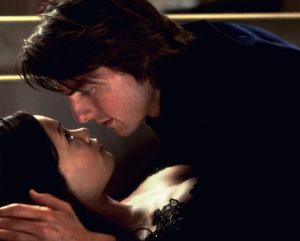
Hunt’s first job is to recruit master-thief Nyah to help him track down her ex, Sean Ambrose (Dougray Scott), which presents a dilemma to them both. The mutual attraction Nyah and Ethan is about as subtle as college student’s Tinder profile, and after a foiled heist and brief car chase, the two of them develop a romantic connection. The connection becomes problematic when Hunt’s unnamed handler (Anthony Hopkins), orders him to ask Nyah to seduce her ex so IMF can track down the deadly virus he stole in the film’s opening sequence. Yes, if you are thinking it’s completely fucked that they introduced a great character who can rival Ethan as a spy and then reduce her to seductress so he can accomplish the mission while the villain is oggling her, I’m completely with you and crap like this in cinema needs to change. I’d like to say Ethan would agree with us too, but he reluctantly agrees to try and persuade his new partner to go along with it, since the virus has the potential to kill millions if unleashed in an urban area. On top of the “dangle the sexy spy as bait” problem Nyah and Ethan have with this, the feelings they have developed are not ones either of them want to betray. They both know the risk of this terrible virus reeking through a city or country, but their baseline humanity and decency tell them it’s wrong to use Nyah this way. Whereas a 1960’s James Bond would most likely slap her on the ass and send her into the bad guy’s lair, this dilemma is one that haunts Nyah and Ethan throughout the film. Ethan demonstrates that morality is a factor for him and he’s not just some robotic spy that will spray a machine gun and throw anyone in the line of fire if it serves the security of his country.
Unfortunately, that’s about as deep as it gets for Hunt this go around. Nyah eventually goes along with the awful, degrading plan – and Ethan spends the rest of the film torn between trying to get Nyah out of the villain’s clutches while getting a hold of the virus. Insert explosions, face-swapping (incidentally, Woo’s previous American film before this was the Nicolas Cage/John Travolta action vehicle, Face/Off), motorcycle chases, and a pretty brutal fight between Hunt and Ambrose at the end. Bad guy is dead, virus is contained thanks to ultimate badass Nyah injecting herself with it to keep it that way, and Ethan and Nyah walk off holding hands. The world is right again, but we’ve learned that Ethan Hunt isn’t only a fighter, he’s a lover too.
Mission: Impossible II received pretty mixed reviews when it was released in 2000. Some people thought that it and the James Bond film released earlier in the winter of 1999 – The World Is Not Enough – should have traded plots and stunt sequences. I remember thinking, in my first year of legal adulthood: Are these the two polarities of spy films? Does it have to be all blow them up and fancy camera work; or a dry, recycled plot (The World Is Not Enough is not good) with stiff caricatures that seem to be place-markers? Fortunately, three-years later, the successful show runner of a few hits like Felicity, Alias, and Lost named J. J. Abrams proved to me that was not to be the case with his feature-length directorial debut, Mission: Impossible III.
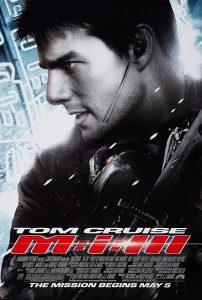
I’m going to warn you, I’ll probably start gushing about Mission: Impossible III. This film is certainly “Ethan’s Coming Out”, as we get to know the character quite a bit, and I feel like that is one of the film’s biggest strengths. As with the transition from the original film to Mission: Impossible II, the Ethan Hunt we meet in this film is nothing like the one we saw in the previous one. His hair is conservatively cut, he’s retired from IMF, and he’s engaged to be married. After the film’s gut wrenching opening (if you haven’t seen it there’s no way I’m going to spoil it for you here), we are taken to Hunt and his fiancee, Julia, at their home during an engagement party. Ethan’s pouring drinks, shaking hands, dancing, and pretty much on the precipice of domestication – and he seems pretty cool with that. It’s a clear facade, and I’d love to know if Cruise intentionally played up the cheesy, perma-grin Hunt has on his face the entire time during this scene. As soon as we hear the phone ring and Ethan answer it to an automated voice offering him a chance to win an all expense paid trip to somewhere, we know everything’s about to get turned upside down.
Ethan finds out one of his top cadets – Lindsey – has gone missing while on assignment going after the world’s most dangerous and elusive arms dealers. IMF requests Ethan put together a team and go after her, but Ethan refuses. Later that night, after a dream that recalls Lindsey’s training and ultimate completion of Ethan’s tutelage, Ethan informs his fiancee that he has to go out of town for a few days on business. He’s shaken and reluctant, but has the resolve of an old cowboy who’s going on that one last ride.
This is not the bullet-blasting, borderline John Rambo version we saw of Ethan in the previous film. The man looks very uncomfortable during the rescue operation of his former student. Though he executes the mission nearly perfect, Ethan ignores protocol by bringing Lindsey aboard their rescue helicopter, not knowing there is an explosive charge implanted in her brain. The device detonates after they narrowly escape pursuing helicopters, and Lindsey is killed. Hunt is later reprimanded for his dismissal of procedure. You can tell this devastates him – and coupled with grief – Ethan seems almost paralyzed when he arrives back home to his wife. Defeated he may be, Ethan gets a hunger to settle the score with Lindsey’s killer – the absolutely stone-cold, evil Owen Davian, arms-dealer extaordinare.
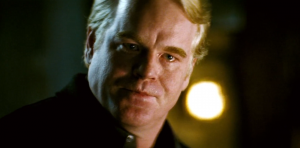
I would be remiss if I did not mention Phillip Seymour Hoffman’s brilliant portrayl of the franchise’s most terrible villain so far, in my opinion. Hoffman gives a chilling performance as this criminal, who shows no regard for humanity or forgiveness. The dynamic between he and Ethan is a roller coaster of terror. They both terrorize each other at different points in the film, and Ethan is almost pushed to extremes that would match Davian’s villainy. This tension and suspense is one of the high points of the film, showcasing the skills of Hoffman and Cruise as great actors. In my opinion, Hoffman totally steals the show, and people don’t talk about this performance enough.

Julia (Michelle Monaghan) also brings a new dynamic to Ethan’s life – love and devotion. There’s never a doubt in the film that Julia is the most important thing to Ethan. When Ethan finds out he has a chance to catch Davian, he marries Julia and promises he’ll tell her everything when he returns. Ethan knows himself well enough to know he’ll never rest until Davian’s caught. He’s not capable of letting it go. He also discovers Davian is about to purchase some dangerous biological weapon called the “rabbit foot”, though we never actually find out what it is in classic J. J. Abrams style. Hunt departs, and all hell breaks loose.
They capture Davian after an elaborate kidnapping at the Vatican. The heat really gets turned up on their plane ride back to the U. S. Cruise nearly throws Davian off the plane, dangling him from the bowels of the plane, threatening to drop him to his death. Luther Stickwell, whose been with Ethan since the first film, acts as his conscience and urges Ethan he’s better than that. Ethan stops himself and pulls Davian to safety. Once they land, Davian’s mercenaries attack, and the arms-dealer makes an escape. Before he leaves the country, one of his henchman kidnaps Julia. Hunt is arrested and charged by the IMF for conducting an illegal operation. After a pretty elaborate escape, Hunt heads to Shanghai to track down Davian and rescue his wife.
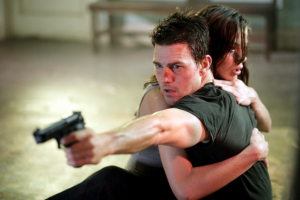
The rescue doesn’t exactly go by the book. After Hunt steals and exchanges the “rabbit’s foot” for Julia’s life, he finds out he’s been betrayed by someone in his agency. Eventually, he escapes, but finds out Davian’s activated an explosive charge in his head, so it’s up to Julia to save him. Ethan survives, Davian dies, and the truth about what Ethan really does comes to light. The film actually ends with Ethan bringing Julia into the IMF headquarters to meet the rest of his team. An undercurrent theme that reoccurs throughout the film is that people in Ethan Hunt’s role can’t have spouses and families. They are bound to a lonely existence of chasing villains and saving the world – but Ethan and Julia seemed to have proved them wrong, and once the credits rolled I remember I thought to myself that’s probably the last Mission: Impossible film I’d see with Ethan Hunt.
It seemed like a fitting end to the arc: super spy comes into his own (the first film), gets pushed to the extreme (the firework laden second film), and then saves the love of his life with the seasoned skills he has while saving the world (the third film). If you ask me, it’s a nice little trilogy that Paramount could have continued with Hunt possibly making cameo appearances in next installments. In fact, Mission: Impossible III was not the box-office success Paramount hoped for. Due to Cruise’s erratic behavior during the year leading up to it’s release (go Google “Tom Cruise Oprah’s couch” or “Tom Cruise Matt Lauer interview”), audiences seemed to be turned off by the blockbuster golden boy. The mediocre financial returns, Cruise’s temporary diminished box-office appeal, and the conclusive ending all seemed to spell “REBOOT”. That wasn’t so. Thank goodness.
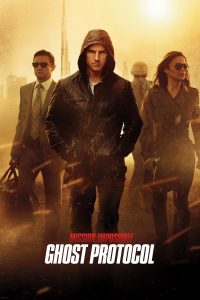
Ethan Hunt returned in Mission: Impossible – Ghost Protocol. Despite the third entry being my favorite, this one is by far the most fun to watch. Taking the frenetic pace of the second film and coupling it with a high-stakes story that focuses more on the team aspect – which was always the foundation of it’s source material – director Brad Bird injected new life into the waning franchise. You’ll forget every odd thing Tom Cruise has ever said or done as soon as the film opens with Ethan Hunt breaking out of a Moscow prison he’s embedded himself in for over a year to track a mysterious operation one of the prisoners may know about. Not long after Ethan is out, he rejoins Benji (Simon Pegg’s techno-wiz from the previous installment) and gets into the Kremlin. Things go bottoms-up when a bomb is detonated and the Kremlin is essentially destroyed, leading the United States government to do the thing every IMF agent no doubt dreads – disavow.
So, right away, I kept asking: Where’s Julia? In the previous film, Hunt’s entire existence shifted from saving the world to building a life with the woman he loved. His orbit of Julia and being with her was cemented by the end of the third film, so I was scratching my head as to how a married man negotiates with his wife to leave and go undercover in a Russian prison for a year. Benji mentions he was sorry to hear about Julia during their nail-biting infiltration of the Kremlin. Nothing specific, just implying that they separated at some point. We later find out that Julia was believed to be murdered, the presumed catalyst of what lead Ethan back into the fold of IMF and his imprisonment, since he murdered her killers and was locked up in previously mentioned Russian prison. This plot-twist comes in the middle of the film and is a great explanation, which makes Ethan’s new resolve even more compelling.

The stakes are quite high, as the destruction of the Kremlin was a ruse by an evil-genius – clichéd antagonist design or not – to access nuclear weapons and launch a nuclear attack to proliferate Armageddon 0f sorts. Ethan has a small team of the members present during the Moscow attack, and their hunt for this madman leads them to Dubai. I still think the most fantastic, over-the-top, and obligatory Ethan Hunt daredevil sequence is the climb of Dubai’s Burj Khalifa. In the big picture of the film, it has little to do with the plot, but it’s beautifully shot and choreographed, as well as a hell of a lot of fun.
Back to Hunt’s journey, we learn that Julia’s death has pushed him back to the lonely life of an IMF agent. Cruise’s portrayal of Hunt in this film is much more of a man that’s made himself a machine. Hunt never hesitates and hurtles himself in front of any danger that faces him. He never even speaks about Julia’s death, we actually hear about that from new team member William Brandt (Jeremy Renner), who blames himself because he was assigned to watch and protect Ethan and Julia while they were on a vacation. Brandt feels that he’s had a role in shaping the unspoken pain that seems to drive Ethan’s potentially self-destructive recklessness in Ghost Protocol. Cruise’s performance is pretty on-point in this film, telegraphing the subtleties of a man torn between the life he hoped he could’ve had and the life of an IMF agent that he’s molded himself to fit in perfectly, whether he steps in or out of it.
By the end of the film, Ethan and his team save the day, stopping the nuclear missile from detonating. It’s launched, but only clips the tip of the Transamerica Pyramid and landing harmlessly in the San Francisco Bay. Ethan and his team meet for beers in Seattle at the film’s end, joined by Luther Stickwell, who jovially listens to Ethan recount the mission. When the celebratory table is down to just Ethan and Brandt, Ethan confides that Brandt didn’t fail to protect Julia. She’s alive and he arranged her death to be faked so that upon their separation, she would be safe and he could check in on her from time-to-time. We see Julia arrive on a water taxi and spot Ethan in the crowd, waving to him and offering him a warm smile before he walks into the darkness. I’d say this explanation offered just made shrug my shoulders. Again, it seems odd that such a monumental character shift in the previous film would just be brushed aside with “Oh well, guess this marriage thing didn’t work out”, but I understand they want to make Mission: Impossible films, not the Ethan and Julia story. As far as Julia is concerned, it looks like we will getting some more insight into what happened, as Michelle Monaghan reprising the role for this summer’s sixth installment. As a fan of any sort of canon, I’m looking forward to finding out more about what went down between Julia and Ethan. Also, I don’t think it’s fair to the great character Michelle Monaghan brought to life in Mission: Impossible III. Julia deserves more than a cameo, so I’m hoping she’ll get that.
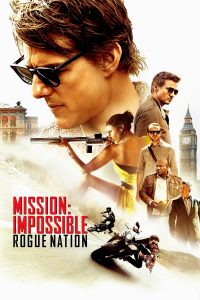
Next up, the fifth entry into the franchise, Mission: Impossible – Rogue Nation. If you thought Ghost Protocol was so fast you might miss it, Rogue Nation moves at a blistering cadence. Director Christopher McQuarrie gives us little time to take in the plot, so if you are watching this for the first time, pay attention. I have a hard time expressing my feelings about this film, because on one hand I loved it, and on the other I felt like it just moved too fast. Yes, I know, these are action films, but the plot devices seem jumbled at times, though I’d say there’s far more to love about this film than complain.

Ethan Hunt is in fine form as IMF’s super spy. The film’s opening is so outrageous it’s almost like the end credits should have just rolled immediately after. I’m sure you’ve all seen it: Ethan hanging on to the side of a plane taking flight, a small door handle his only lifeline. I have to imagine among stunt coordinators in the film industry, they must have considered this the winning spray in any sort of pissing contest among their peers that year. I remember the audience in the theater actually laughing in shock during my first viewing, even though the bulk of the sequence had already been playing for months in almost every trailer released in the marketing campaign. There’s something about seeing that sequence on the big screen.
The stunt itself does reinforce the plot: Ethan is tracking an organization that is the anti-IMF, the Syndicate, and this has been an obsession of his since the previous film. He feels he’s hot on their trail, so dangling off the side of an airplane in flight is a risk he’s willing to take to bring down an organization he believes is the most dangerous on the planet. Ethan’s gone so far down the rabbit hole chasing the Syndicate, he’s not noticed that the director of the CIA, Alan Hunley (Alec Baldwin), is advocating for the dismantling of IMF. The destruction of the Kremlin in the previous film, compounded by the fact IMF agents were present during it, hasn’t sat well with government oversight. As Hunley declares Ethan a wanted man, the spy has come face-to-face with the head of the Syndicate – Solomon Lane (Sean Harris) – and barely survived after he is gassed and tortured. The only reason he survives is because of Ilsa Faust (Rebecca Ferguson), an MI6 agent who is deep undercover in the Syndicate. Hunt escapes, but now he’s trying to bring down the Syndicate while evading a manhunt underway by the CIA.
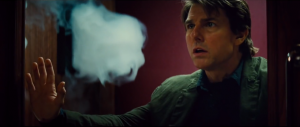
There’s a desperation in Ethan in this film that is similar to his emotional state in Mission: Impossible III. The stakes are high for Ethan personally, but not involving his wife and future. Ethan is fighting for the survival of the driving force in his life, the IMF, and it’s come under fire by those who seek to either control it or destroy it. In a vein that seems to run through all the Mission: Impossible films, Hunt is betrayed by the very organization he’s served and tried to protect since the first film. At this point, it’s business as usual for him. He seems to be paving his own road to salvation in each film with each death-defying stunt and explosion. The man in this film doesn’t look back or forward, he’s only concerned with taking out his nemesis. Ethan Hunt is the most weaponized version of himself in this film. At one point in the film, Ethan literally dies, but is brought back.

Ilsa Faust is a welcome addition to the film. Her character has the same objective as Ethan and she has also been let down by her British Intelligence handler. There is certainly a connection made between the two of them, but the line never crosses into romantic territory. It’s flirtatious and they use one another to get to where they need to go at certain points in the film, but by the end of the film there seems to be a genuine understanding between the two characters. They go their separate ways, with Syndicate head Solomon Lane locked up and secured.
All in all, Rogue Nation is the most open-ended of all the Mission: Impossible films. I think that anti-climax is most appropriately pinned to Ethan Hunt’s journey. The hunt to take down the Syndicate is over, Ethan has made a believer out of CIA spook Alan Hunley, and all is back to normal as things can be in the world. Ethan seems pleased that the Syndicate has been stopped, but there is a longing in him as he watches Ilsa depart. Maybe Ethan knows there will never be any sort of peace for a person like him, and despite Ilsa getting her freedom from the handler who betrayed and used her. I imagine someone like Ethan feels torn between the fact he knows he’ll find his way back to IMF, no matter how free he ever tries to be.
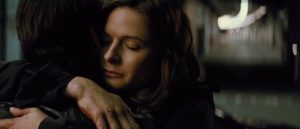
This brings us to Mission: Impossible – Fallout.

Speaking to Comingsoon.net, Fallout writer/director Christopher McQuarrie said:
I’ve seen five of these movies and I don’t know who Ethan Hunt is. One movie sort of dealt with his personal life; the other movies are about people speculating what’s really going on in Ethan’s head. I want to know who Ethan is in this movie, I want an emotional journey for this character, and Tom really embraced it.
It sounds like Ethan Hunt is going to get his version of James Bond’s Skyfall. This Mission: Impossible film will have a lot of connective tissue to the films that came before it, especially Rogue Nation. Rebecca Ferguson, Sean Harris, and Alec Baldwin will be reprising the roles that debuted in the fifth film. This is unique, as the entries to the franchise typically have one-off villains and female leads, so it sounds like I wasn’t the only one that felt Rogue Nation still had more story left. The official synopsis is so brief and generic that it’s not even worth typing up.
What struck me is something that Solomon Lane says to Ethan Hunt in the theatrical trailer for Fallout: “Your mission, should you choose to accept it…I wonder, did you ever choose not to? The end you always feared is coming,and the blood will be on your hands. The fallout of all your good intentions.” It sounds like the past is coming for Ethan. It’s amazing how well under wraps the plot details have always been kept, but I guess there’s not a legion of fans clanging around the internet, begging for plot details. Each Mission: Impossible film I’ve taken a seat in the theater for I know nothing about it’s plot details. And I’ve been impressed every time.

Where will Ethan go from here? August Walker (Henry Cavill) makes an observation that’s in the back of my head each time the IMF or the United States turns on Ethan Hunt and his team: “How many times has Hunt’s government betrayed him, disavowed him, cast him aside? How long before a man like that has had enough?” Walker makes a good point, as the scenario of vilification or being disavowed has manifested itself in some form during four of the five missions we’ve seen Ethan venture out on. At what point do the powers that be realize they’ve kicked Ethan Hunt around enough times to the point they expect him to turn on them. I suspect somehow this will be a plot point in Fallout.
When you mention the great heroes of cinema, most people’s minds wander to names like James Bond, Indiana Jones, Wonder Woman, and other big ticket franchises that people either grew up with or are growing up with. Those heroes either changed the conventions of audiences expectations and had the classic elements of good distilled into their two-hour journey. Their methods put them somewhere between insane, brilliant, and brazen; and often times, luck plays a huge factor in how they come out on top. Ethan Hunt has always stood apart from the classic hero, because he is multi-faceted, but we’re not quite sure how. Tom Cruise gives a performance that opens the door to who Ethan is, but I feel like that door is still only slightly cracked. What’s going to happen when Julia comes back? Where does his relationship with Ilsa go from here? What role will long time friends like Luther and Benji play in bringing him back from whatever edge the events of Fallout push him to?
As the previous two entries seemed to gloss over the deep character work Mission: Impossible III provided us, I’m looking forward to Christopher McQuarrie’s excavation of Ethan’s past. I don’t mean to come down on Ghost Protocol and Rogue Nation, because I think they are great films and have enjoyed each on multiple viewings. Let’s let the past come back to haunt Ethan, if only for the sake we’ll learn a lot more about him, and perhaps a larger audience will get a better appreciation of a character Tom Cruise has spent over twenty years bringing to life. No one knows if this will be Tom Cruise’s final performance in the series, but if it is, I predict these six-films will be remembered as one of the great spy-thriller series in modern cinema. And if it’s not the last film for Cruise as Ethan Hunt, well that’s okay, too.
